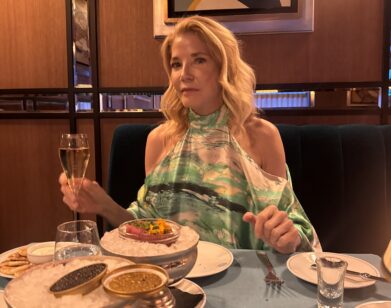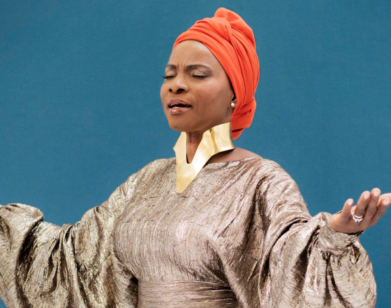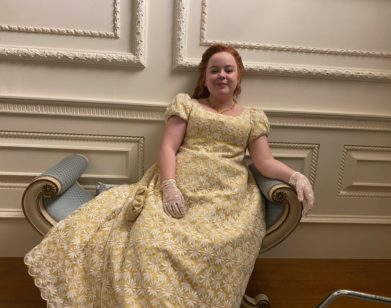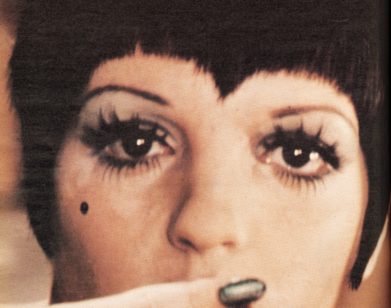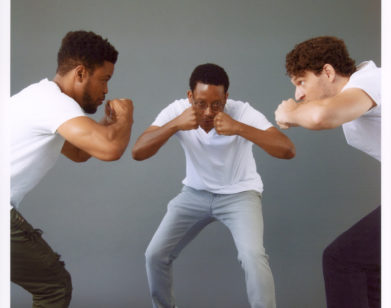HAPPY TRAILS
How Theresa Buchheister Rescued Experimental Theater in New York
Strand book-buyer and seller. Pokémon voiceover director. Grey Gardens set builder. It’s hard to find a piece of art you love that Theresa Buchheister hasn’t touched, from the mainstream to the niche. As artistic director of The Brick Theater, a hub for experimental work in Williamsburg that won an Obie Award during Buchheister’s tenure, they have produced and performed in hundreds of shows, many of which may only be experienced by a highly adventurous subset of New York’s theatergoing population. Such theater can be mysterious and baffling. Clearer, but no less magical, is what happens offstage: togetherness. Buchheister is a divine octopus, managing, devising, fundraising, and supporting artists at every turn while ensuring that they have a place to gather and create.
After two decades in New York, the city’s increasing costs have forced Buchheister to reconsider the practicality of working in experimental theater here. They will be returning to their home state, Kansas, in September, and succession plans for The Brick and Exponential, a January festival of new works they founded, are in the works.
Just a few weeks before their move (which may or may not be permanent), Buchheister spoke to me at Brick Aux, a post-pandemic addition to The Brick’s repertoire. A hybrid rehearsal room, performance venue, and admin office, the space is but another jewel in Buchheister’s crown, which they wear humbly, and a physical manifestation of one of the key tenets of our conversation: building and maintaining space for community, obstacles be damned.
———
BILLY McENTEE: Okay, here we are.
THERESA BUCHHEISTER: Hi.
McENTEE: Cheers with our LaCroix’s [la-CROYS].
BUCHHEISTER: LaCroix [la-CWAH]?
McENTEE: I think you’re right! Okay: I’m going to start with maybe a harder question. As you look back on 20 years in New York and about five leading The Brick Theater, I’m going to ask you to resist your very selfless temptations and tell me what you’re most proud of?
BUCHHEISTER: Oh, that is such a direct question. It’s interesting to be an attendee of your own funeral, which is how the last month has felt. I always wanted to sort of Tom Sawyer it and be like, “Let me hear what people say about me.” I hear some of it reflected back at me from different eras, from Silent Barn, Vital Joint, The Strand, Housing Works, Title Point, Drama Bookshop. Being in New York, the spaces you love close and then you’re faced with the question, “What is community, then? Why do people come together, and why do they stay connected even when the architecture around them fails?” So, I’m proud of the community that I crystallized via The Brick and Exponential over the past five years. And one of the observations I’ve made is that space helps with community. You don’t need it, but it is helpful. The other is, I’ve been part of artist groups that are really examining how and why they’re doing things, artistically, ethically, philosophically. And it has also exposed to me the people who I don’t think ask those questions of themselves, because what they’re doing is indicative of their values, or their lack thereof.
McENTEE: Sure is. You’re from the Little Apple: Manhattan, Kansas. Is that where you’ll go when you move in September?
BUCHHEISTER: It is not. I’m going to Lawrence, Kansas. It’s small, and I know I’m going to feel the smallness, but I have no doubt that there’s going to be some interesting stuff going on.
McENTEE: Is there a kooky subgroup of people who you’re excited to explore artmaking with? Or do you feel like you’re going to fire it up and start it yourself? Or is it, “I need a break from theater”?
BUCHHEISTER: All of the above. Because of how intense the last four years have been, a lot of my ideas and personal artistic projects and goals have been on the back burner. There are a lot of folders in my Google Drive that I’m like, “Ooh, maybe I’ll get to spend time on this book idea, this film idea, this TV show idea, this play idea.” Or maybe I start doing Salon, a long-running program that I’ve done here.
McENTEE: Of shorter experimental works in the community?
BUCHHEISTER: Yeah. And those things could all happen, but I know that nobody needs Big City Theresa storming back into Kansas being like, “Listen, peasants, let me tell you about art…”
McENTEE: The peasants could do worse than to listen to Theresa. But yes, you’re very humble.
BUCHHEISTER: I want to listen and observe for a while. I do know some of the venues that exist and I know of many people making things. Kevin Wilmott is there, who’s the head of the film department at KU [University of Kansas], and he won an Oscar for writing BlacKkKlansman. He also bought this weird Lutheran church in which I previously did a residency called Pilot Balloon, run by Matt Hislope and Josh Meyer. So now I’m like, “What are you doing with that church? Can we do a weird TV show there?” I also have to make money, but I don’t want to do it in a way that creates a little prison for me.
McENTEE: Are you able to do voiceover work from over there?
BUCHHEISTER: There’s also plenty of studios in Kansas City. I don’t know how to drive, so I might have to learn. When I lived there, I worked overnight shifts at a gas station, which was one of my favorite jobs ever.
McENTEE: Tell me why.
BUCHHEISTER: Everything. It was a job that doesn’t expect you to think about it once you leave. The shift was from 9:00 p.m. to 7:00 a.m and the regulars were truckers, people who buy scratch offs, and frat boys mostly. So I’d have these wild conversations, but your obligation is just to do your job. Count the two liters, count the cigarettes, make sure that things are restocked, change out the nacho cheese, change out the hot dogs, talking to people, listening to the radio. I read Ulysses the summer before I moved here during my shift. If you’ve got to make money, it’s not a bad way.
McENTEE: Well, the notion of just observing in order to get a sense of what the community is and how you can function within it is so generous. Maybe you can pull it in a Theresa direction when the time comes.
BUCHHEISTER: Oh, I do have fantasies in that regard too, and I might as well say them out loud.
McENTEE: Please.
BUCHHEISTER: There’s a partnership between Oklahoma City Rep and Under the Radar because of personal connections. And I’m like, “Could I do something with Kansas City Rep?” I would love to pitch them Nate Weida and Ben Holbrook’s musical The Dastardly Thornes vs the Town of Goldhaven – an absurd, queer cowboy musical. They could bring some performers from New York and hire some from Kansas City. I basically said to [Brooklyn theater artist] Peter Mills Weiss, “Just come to Kansas for a month. You could stay at my parents’ house, your expenses would be really low and we could just make something.”
McENTEE: You and Bridget Everett are both from Manhattan, Kansas. And correct me if I’m wrong, though you’re both icons of downtown theater, you have not met?
BUCHHEISTER: Well, the only time we met, she was terrified of me. One of the first performances I saw in New York was by her, and I was thrilled by it—
McENTEE: Did she guzzle chardonnay?
BUCHHEISTER: Yeah. And she put her vagina in my face.
McENTEE: She put her vagina on your face and I caught the cork that she spit out from the bottle. I was six rows back and felt like I had caught lightning or something.
BUCHHEISTER: You felt like it was an anointing or a baptism?
McENTEE: Yes.
BUCHHEISTER: Well it made me be like, “This is where I need to be for 20 years.”
McENTEE: Was it at Joe’s Pub?
BUCHHEISTER: It was. I went to Neal Medlyn’s Nirvana show there and I brought three young folks who were interning for me and two of my oldest friends, Fil and Xavier. We had a very different relationship to Nirvana, and we were all getting really emotional and I turned around and I saw Bridget right behind us. I was like, “Oh god, act normal Theresa.” Then after the show, we go out front and we’re crying and having a moment. We’ve lost a lot of friends, so this idea had hit us: “If our friends were alive, what would they be doing?” Then Bridget walks by and Fil’s like, “Bridget Everett! Bridget Everett! Theresa’s from Manhattan, Kansas too!” She started to walk over, very kindly, and was like, “Oh, that’s so cool.” I turned around and I’m covered in tears. Then Fil said, “And you put your vagina in their face!” And I don’t think that that offended her. Obviously, it’s Bridget Everett. But I think it was sort of like, “These people are a mess and I do not need to engage with this.” Anyway, so we’ve met once.
McENTEE: Incredible. I want to pivot a little and talk about the realities of making experimental work in this city. To whatever degree you’re comfortable sharing, are finances playing a role in this move?
BUCHHEISTER: Finances are a really big part of it. It’s not just because of The Brick. The Brick does need more money. My income as the artistic director at The Brick is less than $25,000 dollars a year, which anyone knows is not enough to live in New York. I’ve always had other jobs. I’ve been working in voiceover. But in reality, I work seven days a week at The Brick. Then around May, it hit a point where my account was hundreds of dollars in the negative. I don’t have savings. I couldn’t get on a train to see my friend’s project. I had to eat free food. And I also had to show up for artists every day and act like I was fine. When you don’t have money, the hole just gets deeper and deeper. I’ve scrounged myself out of it so many times, but it just got to a point where I was like, “I can’t actually get myself out of this one.” I’d been fighting to find a way to stay here for so long, but as soon as I made the choice to leave, it was like all the potential opened up again.
McENTEE: Thank you for your candor. As you probably saw, [The New Yorker theater critic] Helen Shaw responded to your announcement by saying, “We must do something to keep our artists here.” So I’m curious, in what ways have you felt taken care of as a theatermaker, and in what ways have you not?
BUCHHEISTER: I felt taken care of whenever I had the opportunity to collaborate. Working for other people, creating with people and creating space for important and difficult conversations. But it’s the hardest when you don’t have money and you’re hungry and you’re under-rested—and you’re mad because somebody else got money or an opportunity that you wish that you had. Saying and receiving no is a practice of being a person and an artist, but when it feels like it’s taking away your ability to exist and take care of yourself, it hurts a little bit more.
McENTEE: I’m curious if you have a personal definition for experimental theater, or if that just feels like a Rubik’s Cube mixed with a cat’s cradle of a question?
BUCHHEISTER: That phrasing is great because it’s both. There’s a lot of white cis male elitism that formed my initial perception of what experimental theater is, and it doesn’t mean that I don’t like those artists, but there was a lot of unpacking early on about where I fit into that. But the act of making it with other people and seeing other people make it has changed my perspective. Now, I would say that it can be in any form, but is it questioning, or is it truly an experiment? You can pay homage to people, you can reference people, but why is it coming out of you or the collective that’s making it? Who is it for, and what confuses or challenges you about it? Because if you already know what it is, and it’s studied and precise and entirely secure, I wouldn’t call it experimental. But people need to have the time to grow as experimental artists. They might recognize that they’re just mimicking something that they love—who doesn’t do that? The first people I mimicked as a child were Buster Keaton and Christopher Lloyd. And that’s still a part of who I am, but I was searching for my identity through other people. You can look at artists that inspire you, but at some point it needs to flip into being.
McENTEE: You go to so many shows. And you don’t just attend shows, but you engage with the people there beforehand and then you invite them to Aux for a whiskey and a chat. I’m curious if you think that’s the secret in a city where opportunities are scarce.
BUCHHEISTER: It’s sort of the secret. I’m not necessarily an effortlessly social person. I remember in 2011, at a cast party for the show that we did at Housing Works, we had a tarot reader who did a two-card draw for me. It was a “greatest strength, greatest weakness” read, and he was like, “Your greatest strength is your community and your greatest weakness is meeting people. That makes no sense.” And I was like, “It makes all the sense.” I felt seen for the first time in my life. I’m terrified of introducing myself to people, I’m scared of interjecting into a conversation that I wasn’t invited into. But once I meet someone and we can sit down and actually talk, I can do that. I spend so much time being shy and sitting on the corner smoking cigarettes and reading a book, hoping somebody will be like, “I read that book too.” But once you start to build community and you also recognize that people need to be welcomed into it, you make the effort. It’s not just going to a show and getting on the train and leaving right after. It’s the potential for relationships that can last a lifetime.
McENTEE: That’s a magical note to end on. Thank you very much, Theresa.
BUCHHEISTER: Thank you, Billy.


